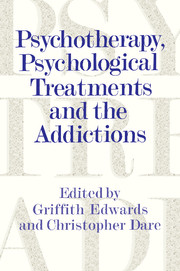Book contents
- Frontmatter
- Contents
- List of contributors
- Psychotherapy and psychological treatments of substance problems: generalism, specialism and the building of bridges
- Acknowledgements
- Part one Backgrounds to therapeutic understanding
- 1 Addictions over the life course: therapeutic implications
- 2 Psychotherapy and the life cycle: individual and family
- 3 Personal strengths and vulnerability in family and social context
- 4 Therapy in the eye of history: three episodes from the nineteenth century experience
- Part two Treatments
- Part three Postscript
- Index
2 - Psychotherapy and the life cycle: individual and family
from Part one - Backgrounds to therapeutic understanding
Published online by Cambridge University Press: 05 August 2016
- Frontmatter
- Contents
- List of contributors
- Psychotherapy and psychological treatments of substance problems: generalism, specialism and the building of bridges
- Acknowledgements
- Part one Backgrounds to therapeutic understanding
- 1 Addictions over the life course: therapeutic implications
- 2 Psychotherapy and the life cycle: individual and family
- 3 Personal strengths and vulnerability in family and social context
- 4 Therapy in the eye of history: three episodes from the nineteenth century experience
- Part two Treatments
- Part three Postscript
- Index
Summary
Introduction
There are two groups of psychotherapies. The one that is informed by ‘academic psychology’ emphasises techniques that have been empirically validated by experimental procedures. The second group is that which develops using clinical thinking. The former group of therapies are mainly represented by the behavioural and cognitive psychotherapies and by combinations of the two. The second group are represented in this chapter, by reference to psychoanalytic psychotherapy and family systems thinking, although there are actually vast numbers of other therapies, humanistic, gestalt, existential and so on, which fall within this set. The first group of psychotherapies can be thought of as relying on quantitative methodology and the second upon qualitative research, although any attempt to make exclusive definitions founders. Clinical intuition cannot be precluded from any therapy and all therapies can, in principle, be validated using empirical techniques. Clinical method depends upon the use of continuous observation of patient response to inform the development of therapy in general, and with a particular patient. This is a form of empirical validation.
This chapter is about the second group of therapies: those deriving from the psychodynamic tradition in combination with family systems thinking. The additional integration of thinking from the field of child psychotherapy and family therapy, into the practice of psychotherapy, contributes resources both to the conceptual schemes and practice. Child psychotherapy demonstrates that communication does not require verbalisation. Dance therapy, music therapy and drama therapy (not to say psychodrama) are psychotherapeutic tools available for adults who, for whatever reason, cannot produce an account of their experience in words, to engage in expressive therapy. Family therapy has shown the therapeutic power of utilising the intimate social network, within which most of our patients live. This chapter recommends that those who wish to practice psychotherapy look to an expansive spectrum of practice to seek effective techniques. The author's own work, in the field of eating disorders, has shown disparate reactions to different treatments depending both on illness characteristics and such factors as age of onset and duration of illness (Dare and Crowther, I994a,b; Dare and Eilser, 1994, 1995). The difference in response to treatment in different age groups of patients can be understood as a function of interactional aspects of development that constitute the family life cycle rather than as simply an age-related function.
- Type
- Chapter
- Information
- Publisher: Cambridge University PressPrint publication year: 1996
- 1
- Cited by



